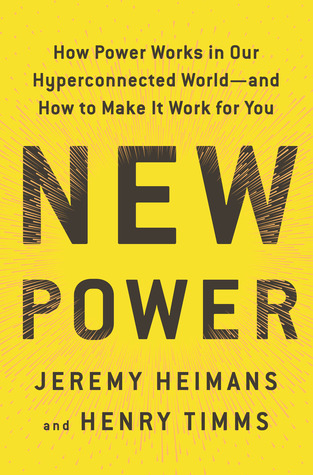More on this book
Community
Kindle Notes & Highlights
Read between
December 17, 2018 - November 20, 2019
the very concept of brand is drawn from the practice of literally stamping an indelible symbol of ownership on an asset.
Step 3: Lower the barrier, flatten the path
the new power era has promoted a form of activism that can be scaled much more quickly than a twentieth-century movement, and can be initiated by almost anyone,
These movements can more easily include wider groups of people, including those who previously had been left on the sidelines or couldn’t easily participate.
What is common among all these things is that we are seeing the barriers to participation lowered and a heightened focus on improving and streamlining user experiences.
In a world awash with competing opportunities in which to take part,
achieving “frictionlessness”—removing the barriers to action and engagement—has become the necessary art of ...
This highlight has been truncated due to consecutive passage length restrictions.
Step 4: Move people up the participation scale
the “super-participants” in any movement or new power community do some of its most important work.
But this new capacity to get many more people in the door comes with incredible opportunities for impact,
participation scale.
On the far left of the scale are the definitive old power behaviors: complying and consuming.
But if you’re trying to build a movement or grow a crowd, you’ll need to unlock a series of new power behaviors. You get people in the door via simple, low-barrier asks toward the bottom of the scale—for
Once you have recruited these new participants, the job is to keep them engaged and to move people up the scale,
Step 5: Harness the three storms
A secret of the most successful movements is that they build up not just in small, steady increments
but off the backs of galvanizing moments of drama and urgency that can be hard to
pre...
This highlight has been truncated due to consecutive passage length restrictions.
When growing a crowd, good organizers take advantage of such moments. Sometimes, those moments happen to them and their job is to embrace them, even if at first they seem like setbacks, not opportunities. Sometimes, they see a moment out in the world and use it to fuel the movement. And at other times, they create a moment out of thin air.
We think of this as harnessing the three storms.
Storm creating
Storm chasing
storm
chasing requires infrastructure to do well.
Anyone building a crowd should be on the lookout for storms that might galvanize their base, and be prepared to act on them within minutes or hours, when the need is greatest...
This highlight has been truncated due to consecutive passage length restrictions.
Byzantine bureaucracies requiring multiple sign-offs aren’t the right tools for storm chasing.
Storm embracing
Whether an organization is creating, chasing, or embracing a storm, some lessons stand out.
For one, urgency matters.
deadlines are everyt...
This highlight has been truncated due to consecutive passage length restrictions.
David vs. Goliath tales are ideal fodder for crowd building, as are crises that threaten the most deeply held values of the community. Defeats matter, too.
Storms can end up as light drizzles, too. And that’s OK.
A new power community that is growing successfully often has a small, incremental growth rate that ticks along month to month, year to year.
those who are most rewarded will often be those who stand out: the loudest, the funniest, the most provocative, the most daring.
This won’t always produce the best social outcomes or the most thoughtful debates.
in this world of constant recruitment, the most effective crowdbuilders will be those who are able to move people up the participation scale, and sustain and nourish a community over the longer term, dealing with the many challenges, compromises, and balancing acts that requires.
Reddit.com is not your main asset.
Reddit’s users and community are your main asset.”
Any new power community has three key actors—its participants, its super-participants, and the owner or stewards of the platform.
Platform owners have the ability to control—or at least substantially influence—who is allowed to participate in the platform, its governance and decision-making; how value is distributed; and even whether the platform lives or dies.
Some new power communities don’t have any person or entity that meets this definition of owner. Instead, those communities have what we call
platform st...
This highlight has been truncated due to consecutive passage length restrictions.
who play recognizable but sometimes informal leadership roles that allow them to channel the energy of the broader community, create rules or norms...
This highlight has been truncated due to consecutive passage length restrictions.
The energy of a new power community is driven by its
super-participants—the
the most active contributors to the platform, and often those who create the core assets that power the ...
This highlight has been truncated due to consecutive passage length restrictions.
As the most engaged users and those who contribute the most—and who often have the most to lose—super-participants are some of the most influential voices inside a new power community.
Finally, participants are the people who “take part” in a new power platform, and tend to
form the vast majority of...
This highlight has been truncated due to consecutive passage length restrictions.
participants generally take part by consuming, sharing, adapting, affiliating, and funding, but not by producing assets or playing an organizing role in the way that super-participants do.


